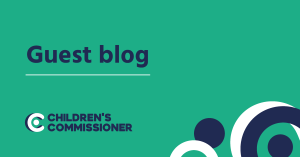Lily Staff is the secondary English Lead at Reach Academy Hanworth Park, an all-through academy in Feltham, Hounslow. The school opened in September 2024 and is part of the Reach Schools Trust. Today Lily shares the early success of Reach’s reading programme which aims to support pupils resilience and fostering a love of reading.
It has been almost a year since we welcomed our founding cohort of Year 7 pupils to Reach Academy Hanworth Park in Feltham. With pupils from 24 different primary schools, we knew that literacy levels would be varied and in our Year 7 baseline reading assessment, we discovered that 19% of the year group had a reading proficiency level of five or more years below their actual age, with only 36% of pupils reading at age related expectations.
Alongside this, many of our pupils, including those with strong literacy skills, arrived feeling negative about reading with some thinking it was boring and a waste of time. ‘What’s the point in reading?’ one pupil asked me in September. Improving literacy on its own wasn’t enough: we had to change the way our pupils viewed reading.
Research shows that pupils who read a lot outside of school have better outcomes[1] and are more likely to overcome socio-economic disadvantages.[2] Most importantly, children who read a lot feel happier.[3] It was paramount that we built a school where children understood the benefits of reading and grew to see themselves as readers.
The barriers to our pupils’ enjoying reading weren’t just poor literacy, but also a lack of resilience – the willingness to keep working through a book independently and allow themselves to be taken in by the story. We wanted to set up a reading programme which would not only check pupils were reading a lot, but also ensure they had the experience of independently reading a whole book, cover to cover.
Our reading programme requires pupils to read three different types of material each week outside of school. Every week, pupils read something completely of their choice (this can be a graphic novel, or a book aimed at younger children), some non-fiction (sometimes this is the child’s choice, and other times we set the reading) and most importantly a specific fiction book which the whole year group read at home (they are set around 40 pages to read each week).
Having the whole year group read the same novel at home has meant pupils come to school genuinely excited to discuss what happened each week with their peers, and we facilitate weekly discussions and quizzes about each section of the book. Pupils are motivated to do the reading knowing these discussions will take place, but also thoroughly enjoy taking part. There is nothing better than talking excitedly about something you’ve just read with someone else who has just read it!
This part of the reading programme also means we can expose pupils to a range of genres and authors, supporting them to form their own preferences and ultimately become people who can make informed decisions about what they want to read next.
Perhaps most importantly though, it means our children get the experience of reading whole novels, cover to cover, independently. For many of our pupils this has been life changing – they’ve caught the reading bug!
Nearly a year later and 75% of our pupils are reading at age related expectations or above. Their biggest achievement, though, is the change in attitude of many of our pupils: we have started to build a culture where loving to read is the norm and where our pupils see reading as key to a happy and successful life.
We are still at the very start of our journey and we know that one year of work is not enough to foster a life-long love of reading. As we continue to grow, we aim to build on the successes of the programme for those who have made enormous progress. For the 25% of our pupils who are still not reading at age-related expectations, we will continue to provide intervention and regular encouragement to close the gap as well as exploring new ways to help this group. Our job isn’t done yet – watch this space!
Some of the pupils on the reading programme share their experiences:
‘I didn’t like to read a lot. If I started reading I would give up quite quickly. Now I really enjoy reading and can read books all the way through. I love reading non-fiction books about football and getting lots of facts and statistics from them.’ Ethan
‘I used to think that because I’m dyslexic I wouldn’t get any better at reading so I never used to read. I really enjoy reading now. I do 30 minutes before I go to bed and I feel really excited to read books – I can’t wait to know what happens next.’ Madison
‘At the start of the year, I really didn’t like reading but this year has made me realise I actually love it. I read lots of different books now and I look forward to talking about them with my friends.’ Sandalu
[1] Sammons, P. M., Toth, K., & Sylva, K. 2015
[2] Sullivan, A., & Brown, M. 2013
[3] Yun-Jun Sun & Barbara J. Sahakian et al. 202




